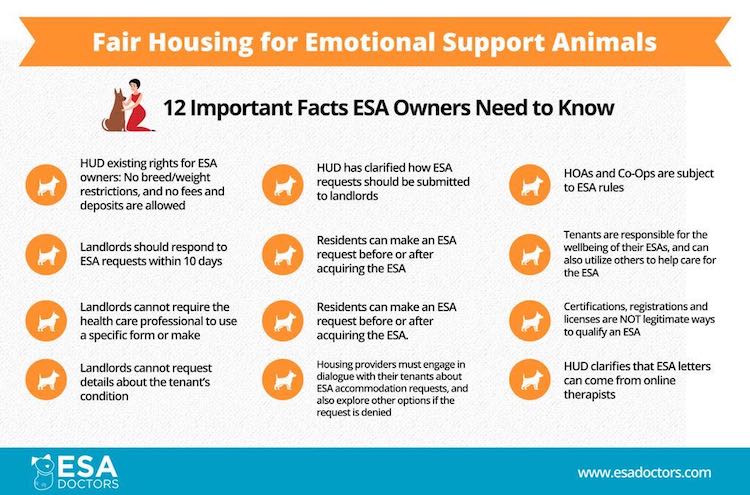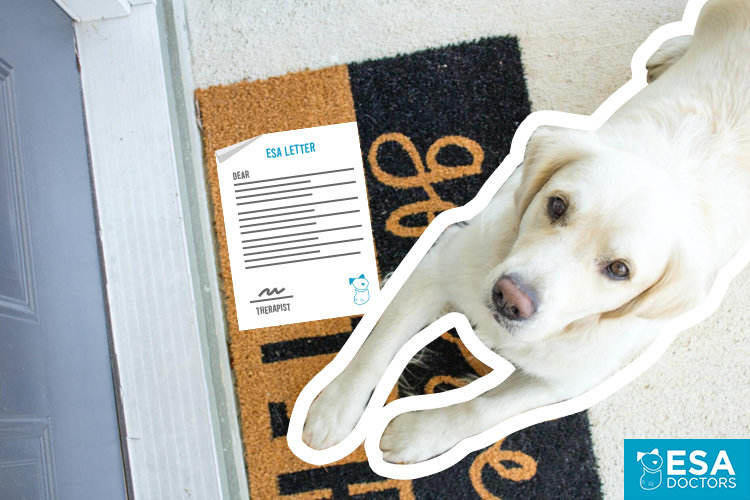To share an ESA Letter with your landlord or real estate agency you can follow a very simple 2 steps approach: Notify and share. As we’ll mention in this article, be aware of your rights and know how to defend them in case your landlord is not willing to comply. But before you can speak to your landlord make sure you have obtained a valid ESA Letter.
How to Obtain an ESA Letter
If you have an emotional or mental disability and your pet brings you comfort and confidence in times of need, then you may be entitled to have an Emotional Support Animal (ESA) and bring it into housing with a “no pets” policy.
For an Emotional Support Animal to become official, a licensed mental health professional must issue a personalized ESA letter. Your licensed professional must diagnose you under the Diagnostic and Statistical Manual of Mental Disorders. The diagnosis needs to state that your impairment affects your ability to perform daily activities.
The licensed mental health professional can be a social worker, a therapist, a psychiatrist, or a psychologist. If you cannot afford a mental health professional on a regular basis, or you have no connections in the state your apartment is in, you can still find help. ESA Doctors can pair you with a licensed therapist online who are licensed within the state you are located.

Please be advised, if you suffer from suicidal tendencies, you will not be able to seek support online. Instead, you should connect with a local therapist as soon as possible.
How to Inform Your Landlord of your ESA Letter
If your licensed mental health professional has issued an ESA letter within the past year, and you currently live in a “no pets” policy home, you can advise your landlord or property management company of your ESA.
Step #1 – Notify the Landlord
Informing your landlord through email, phone, face-to-face or text are all viable options. Explain that you have a disability and you need an Emotional Support Animal to lessen the effects thereof. Be honest about the type of animal you depend on and how many you have.
Generally under the Fair Housing Act, you cannot be evicted from your current home, if you’re in possession of a valid ESA Letter.
If you are looking for a new place to live, you may inform your new landlord or property management after you have signed the lease. Legally you are not required to do so before signing in order to protect ESA owners from discrimination.

Step #2 – Share ESA Letter
After notifying your landlord, present your legit ESA Letter by either providing a hard-copy, a digital copy, or both. If you are moving into a new apartment or housing complex, you may give your landlord the ESA Letter after signing the lease.
If necessary, step #3 – Contact HUD
If your landlord is not willing to accept your Emotional Support Animal, despite your valid ESA Letter, then you can contact the Department of Housing and Urban Development (HUD). The HUD, which governs under the Fair Housing Act, will help you resolve the issues and educate the landlord of the rights both of you hold.
Comply with Additional Documents Request
Landlords and real estate agencies may ask you to complete a form of their own to go along with the ESA Letter. You can comply with such demands. Your licensed mental health professional can help to fill out and sign the document to confirm the validity of your ESA letter.

What Landlords Cannot Do
Under the HUD, the landlord:
- cannot charge extra fees for the residency of the emotional support animal,
- cannot discriminate against the tenant for factors such as race, age, and ethnicity, and
- cannot discriminate against the Emotional Support Animal based on its breed and age.
- Landlords also cannot ask the tenant for the animal to be specially trained or require the animal to wear specific equipment to identify itself as an Emotional Support Animal.
In case the landlord does not accept your ESA and a dispute happens, the landlord cannot retaliate against you if you file a fair housing complaint. They cannot evict you, refuse to renew your lease, keep you from using your premises, increase your rent, terminate your lease, or interfere with any of your rights under the lease.

When Can a Landlord Deny Your Emotional Support Animal
The landlord can deny your Emotional Support Animal or even completely evict you and your ESA if your animal behaves in ways that it causes:
- damage to the property, or
- disturbance or danger to the other tenants.
Therefore, make sure your ESA behaves and is well-mannered while frequenting all living areas of the housing complex. Other tenants may not be welcoming of pets and file disturbances if the ESA is involved in even the smallest quarrel.
Improve your life. Connect with a Licensed Health Care Professional now. (linked)
Know how to Defend Your ESA Housing Rights
In cases where you feel like your rights have been violated, contact the HUD and get in touch with a lawyer. Your lawyer will be able to protect you and help file a court suit for litigation against the landlord.
However, following the above steps of how to inform the landlord will set you on the right path. It will increase your chances of a smooth introduction of your Emotional Support Animal into your new home and you can continue living the life you deserve.








My duplex was accuired by a new landlord about 5 years ago. All their properties are now ‘no pets’. I was grandfathered in since I had already been there for 5 years and had 2 cats. However they made it clear that once mine were gone there would be no more pets allowed. One of my cats passed away at 18 yrs in 2019, and my 21 year old cat passed away a few months ago, 2022. Since their passing my emotional and physical health has declined rapidly. Turns out, broken heart syndrome is a real thing. I have been advised by my healthcare providers to move towards getting an ESA… the landlords are the issue. How do I get the ESA approved without already having the animal? I do have really great landlords, so this is really hard for to figure out how to do this without ruining our landlord/tenant relationship.
Once your healthcare provider gives you an ESA letter, you can share it with your landlord. Landlords are legally obligated to comply with Fair Housing rules, and most are actually very accommodating when it comes to accepting legally qualified assistance animals.
I had acquired my emotional support animal after I moved in. I have exotic pets that were originally approved upon my move-in, in fact, they made it a point to say I didn’t need to list them as their main concern was animals like Dog’s and Cat’s, not reptiles. This has yet to happen, however, as i had just submitted the letter, i am afraid they will change their ruling on that and make me pay a fee and a rent to keep them here. Can they do that?
Also, I am also concerned about the fact that I currently have my ESA living with me as I had sent the letter. Can they deny him cause he was living here prior to submission of the letter?
It seems in your scenario your pets were already approved prior to becoming ESAs as regular pets. In that case it shouldn’t matter that they are now ESAs. The only thing that should change is that you are now exempt from pet fees and pet deposits.
I rent the bottom floor of a house where the landlords reside upstairs. Can my son be denied an ESA due to it being “their” home?
Please see FAQ #20: https://esadoctors.com/faq/#faq-question-1633435956611
My landlord is stating that I must have the RA form sent to them directly from my doctor as they cannot accept an ESA declaration letter alone as proof. I went ahead and had my doctor fill out the form they requested but the landlord rejected the form since it was not delivered to them from the doctor. Is this allowed?
From everything I am reading, it seems like they are not allowed to request a custom form nor contact my doctor directly.
An ESA letter is the only documentation you need. Please see this article for more info on specific forms: https://esadoctors.com/hud-housing-rules-emotional-support-animals/
Hi! I spoke to my landlord today about my ESA and he essentially threatened me on the phone that even if he does allow the animal, I may not be welcome back when the lease ends. Is this a viable argument? He basically said no but from my understanding I could push him on the FHA. I don’t want to have a bad relationship with him at all or cause any problems, but the animal is very low-key and he’s worried everyone will then want a pet in the building. Not sure how to respond or circle back with him since we left things very open ended. Would appreciate any feedback!
If your landlord is not allowing your ESA in your home, they must have a valid reason under HUD guidelines for doing so. You may find this article helpful: https://esadoctors.com/excuses-landlords-deny-emotional-support-animal/
Hello…. I was trying out a cat that I was going to register as an ESA for 3 days at my apartment. Our landlord happened to walk by during this time, saw the cat, and dropped a 5 day notice in our mailbox about a breach in the lease. I got her registered as an ESA and have a doctors letter, but he is not allowing a cat in our apartment. Am I in the wrong? Is this legal?
To clarify, you do not need to register an ESA – the only documentation you need is an ESA letter from a licensed healthcare professional which you can share with your landlord. ESAs need to be cleared before they move in. However, if you submit an ESA letter after they move in, your landlord must still reasonably consider the request.
I am moving to a new apartment and I just renewed my ESA letter and the apartment told me they wouldn’t accept it that I had to go back to my doctor and fill out a form they gave me with their letterhead (off the apartment) before I could move in. It’s called reasonable accommodation/modification request verification. In the letter it states they are permitted to verify applicant is disabled and required accommodation in order to have an equal opportunity to use and enjoy rental unit. It also lists of physical and mental impairments and asks if the physician would be willing to testify in court that the resident does have a need for accommodation. Then there is a section for resident release and states I do not have to sign if after of community or healthcare provider is left blank but it would all be filled in and I’m not sure if this is necessary and if I have to do this on to of providing my ESA letter
The most recent Fair Housing guidance from HUD prohibits landlords from demanding healthcare providers fill out forms like this. You may find this article helpful: https://esadoctors.com/hud-housing-rules-emotional-support-animals/
My leasing office requested my dogs ESA documentation. I provided everything but they sent me a “reasonable accommodation” form that I had to take my to my doctor to sign. The therapist that signed the letter is no longer in practice. The doctor that signed the required paper work said no to testifying about my need for an ESA. BECAUSE of this they are saying they won’t accept the paperwork. is this legal??
You may find #3 in this article helpful: https://esadoctors.com/hud-housing-rules-emotional-support-animals/#landlordunreasonable
I live in a 4-plex that is privately owned with “no pets” in the lease. Would my landlord be able to deny my ESA? We just fostered a dog a few days ago but haven’t approached my landlord yet. We’re in a rut now because he’s a very sweet dog with great manners and we want to keep him. I talked to my therapist today and I’m getting an ESA letter tomorrow. How do i approach my landlord? (We’ve been living here 2 years.)
Does your landlord by chance live in the building? The Fair Housing Act exempts owner-occupied buildings with no more than four units. Otherwise, your landlord would need to comply with Fair Housing rules for ESAs, which supersede “no pet” policies. We recommend being open and honest with your landlord, and having a friendly discussion about your need for an ESA. Most landlords are fine with complying with their Fair Housing obligations.
I provided the ESA letter from my doctor to my leasing office. And they informed me this will not work. They do not allow there to be a “middle man” while going through accommodation request. They will need their lawyers to contact my psychiatrist and to fax paperwork over for her to fill out. Is this legal? Shouldn’t the esa letter have been enough documented to prove that I need my esa? Why will they not accept the esa letter at all?
That sounds like a very unusual response. Under Fair Housing rules presenting a valid ESA letter to your landlord should be sufficient.